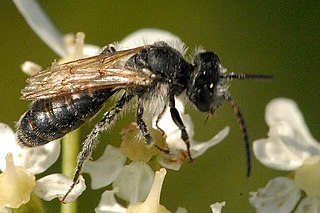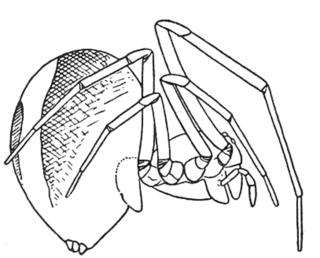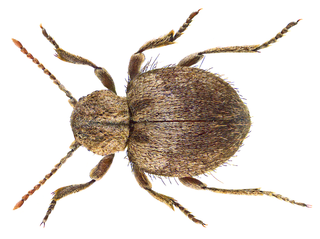Spelling is a set of conventions that regulate the way of using graphemes to represent a language in its written form. In other words, spelling is the rendering of speech sound (phoneme) into writing (grapheme). Spelling is one of the elements of orthography, and highly standardized spelling is a prescriptive element.

The soldier beetles (Cantharidae) are relatively soft-bodied, straight-sided beetles. They are cosmopolitan in distribution. One of the first described species has a color pattern reminiscent of the red coats of early British soldiers, hence the common name. They are also known commonly as leatherwings because of their soft elytra.

Darkling beetle is the common name for members of the beetle family Tenebrionidae, comprising over 20,000 species in a cosmopolitan distribution.

A typographical error, also called a misprint, is a mistake made in the typing of printed or electronic material. Historically, this referred to mistakes in manual typesetting. Technically, the term includes errors due to mechanical failure or slips of the hand or finger, but excludes errors of ignorance, such as spelling errors, or changing and misuse of words such as "than" and "then". Before the arrival of printing, the copyist's mistake or scribal error was the equivalent for manuscripts. Most typos involve simple duplication, omission, transposition, or substitution of a small number of characters.

The Tenebrionoidea are a very large and diverse superfamily of beetles. It generally corresponds to the Heteromera of earlier authors.
The Latin adverb sic inserted after a quoted word or passage indicates that the quoted matter has been transcribed or translated exactly as found in the source text, complete with any erroneous, archaic, or otherwise nonstandard spelling, punctuation, or grammar. It also applies to any surprising assertion, faulty reasoning, or other matter that might be interpreted as an error of transcription.

Anthia is a genus of the ground beetle family (Carabidae) from Africa and Asia. Species of Anthia can spray a jet of formic acid up to 30 centimetres (12 in), which, if not treated, can cause blindness in animals that harass the beetles.
Sensational spelling is the deliberate spelling of a word in a non-standard way for special effect.

Spider beetles make up the subfamily Ptininae, in the family Ptinidae. There are approximately 70 genera and 600 species in the subfamily, with about 12 genera and 70 species in North America north of Mexico.

Melyridae are a family of beetles of the superfamily Cleroidea.
Commonly misspelled English words are words that are often unintentionally misspelled in general writing. A selected list of common words is presented below, under Documented list of common misspellings. Although the word common is subjective depending on the situation, the focus is on general writing, rather than in a specific field. Accepted spellings also vary by country or region, with some rejecting the American or British variants as incorrect for the region.

Dorcatominae is a subfamily of death-watch and spider beetles in the family Ptinidae. There are about 16 genera and at least 190 described species in Dorcatominae.

Calymmaderus is a genus of beetles in the family Ptinidae. There are about 11 described species in Calymmaderus.

Zopherus is a genus of beetles comprising 19 species. They live in the Americas and are adapted to wood-boring.
Tropopterus is a genus in the beetle family Carabidae. There are about 10 described species in Tropopterus, found in South America.

Lasioglossum zonulus is a species of sweat bee in the family Halictidae. It is found in Europe and North America. While the name has historically been misspelled "zonulum", the original name, zonulus, is a noun and does not change spelling under Article 31 of the ICZN, and some sources have recognized this and adopted the correct spelling.
Haplostethini is a tribe of metallic wood-boring beetles in the family Buprestidae. There are at least 3 genera and more than 60 described species in Haplostethini.

Hentziectypus globosus is a species of cobweb spider in the family Theridiidae. It is found in North America.

Trigonogenius is a genus of spider beetles in the family Ptinidae. There are five or six described species in Trigonogenius.













